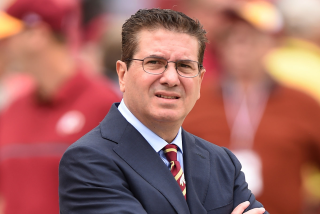Williams Says Presser Offered to Fix Case for $10,000
- Share via
KANSAS CITY — Teamsters Union President Jackie Presser offered to fix a union embezzlement case against former Teamsters chief Roy L. Williams for $10,000 and dangled a kickback if Williams would arrange a Teamster Pension Fund loan to aid in the purchase of a Las Vegas casino, Williams has told a federal investigator in a sworn statement.
Williams made the allegations on Sept. 13 under questioning by Stephen M. Ryan, deputy counsel of the President’s Commission on Organized Crime.
Copies of the 57-page deposition, first disclosed Sunday by the Chicago Tribune, were made available by the government to some defense lawyers here in the trial of nine alleged mob figures on charges of skimming $2 million from Las Vegas casinos. Sources familiar with Williams’ statements confirmed them for The Times.
Faces 10-Year Term
Williams, facing a 10-year prison sentence on his conviction for trying to bribe then-Sen. Howard W. Cannon (D-Nev.), is a government witness in the trial here. Cannon was never charged.
Williams, on the witness stand Monday, denied that he would make up something in hopes of getting his sentence reduced. “I decided I should come up with the truth that I had been withholding for years,” he said. “I’m 70 years old, and when you get on the dark side of the cloud you do some serious thinking.”
In his interview with Ryan, Williams said that Presser approached him in the 1970s, after he, Williams, had been indicted in a union embezzlement case. Williams, then a rising Teamsters official, quoted Presser as saying, ‘ “Oh, just forget that case, it’s not coming to trial. They are going to withdraw that.’ ”
Reply Not Noted
“And he said that if he had $10,000 he could get the damn thing fixed,” Williams recalled. The transcript does not indicate how Williams responded to that offer.
Williams stood trial, but was acquitted.
“You have no doubt in your mind that . . . Presser solicited $10,000 from you with the promise that he could get the case dropped?” Ryan asked.
“That’s right,” Williams responded. “And he was going to talk to somebody by the name of Shapiro . . . . He talked like he was from Washington. I don’t know.”
Presser’s spokesman at Teamsters headquarters in Washington, Duke Zeller, could not be reached, and his office declined comment. Presser also was said to be unavailable.
Nick Charkas, deputy chief counsel of the President’s commission, said that he could not comment on Williams’ statements.
Williams said that, in 1974-75, Presser, then an officer in the Teamsters local in Cleveland, approached him about obtaining a Teamsters Central States Pension Fund loan to be used for the purchase of the Tropicana Hotel in Las Vegas, a loan that Williams said the pension fund had twice rejected. Williams did not identify the potential borrowers.
‘We Could Both Make Money’
He quoted Presser as telling him: “We could both make some money if you guys would go along and get this loan for these people.”
(A separate investigation by a federal grand jury in Cleveland is probing Presser’s role as an FBI informant. Presser’s relationship with the government led to a Justice Department decision not to prosecute the Teamsters chief on charges of defrauding his hometown local of more than $500,000.)
Williams answered Ryan’s questions under a grant of immunity from prosecution for anything he revealed, except for the crime of perjury.
In the deposition, Williams said that former Teamsters President James R. Hoffa ran the union from prison while serving sentences for jury tampering and fraud. Williams said that he had no doubt that Hoffa, who disappeared in 1975, was killed to keep him from regaining power in the Teamsters Union after his release from prison.
‘People From Teamsters’
“He didn’t get in no stranger’s car that day at the cafe,” Williams said. “I don’t know who came up to get him, or anything, but he would have never got in your car if he didn’t know you . . . . It had to be people from the Teamsters Union, or organized crime, that he was associated with and probably had conversations with.”
Williams, who listed Teamsters locals in St. Louis, Chicago, on the West Coast, New York, New Jersey and Philadelphia that he said were “influenced” by organized crime, was asked if a Teamsters’ president could possibly “change and disrupt the activities of organized crime.”
“Not without having a bigger organization than they got,” he said. “They was here a long time before any of us ever got here, and they have got pretty powerful. And you fellows haven’t been able to do nothing with them either.”
Robert L. Jackson reported from Kansas City and Ronald J. Ostrow from Washington.


